
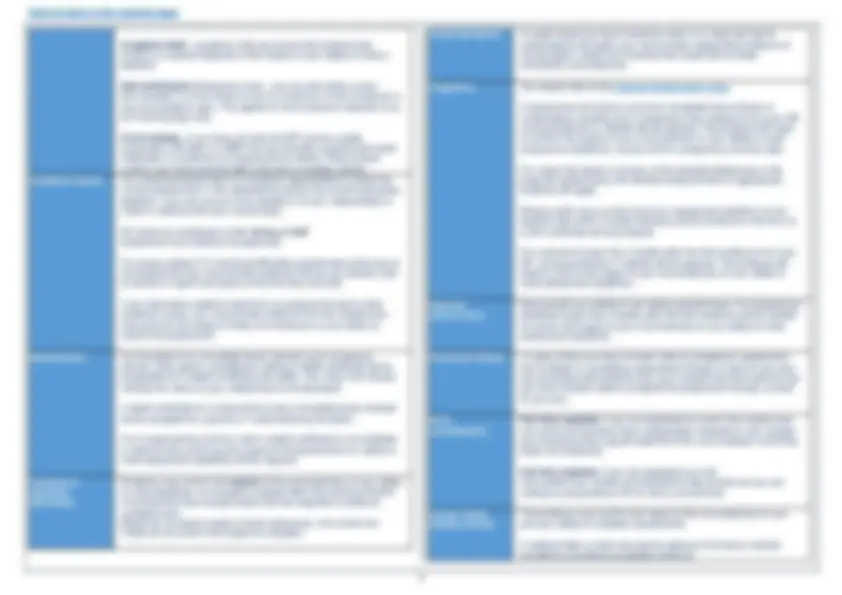
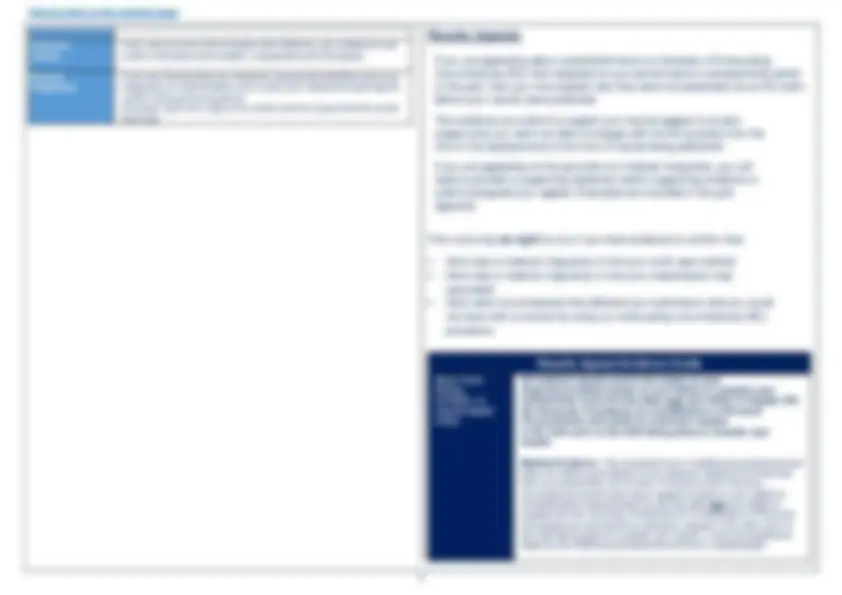
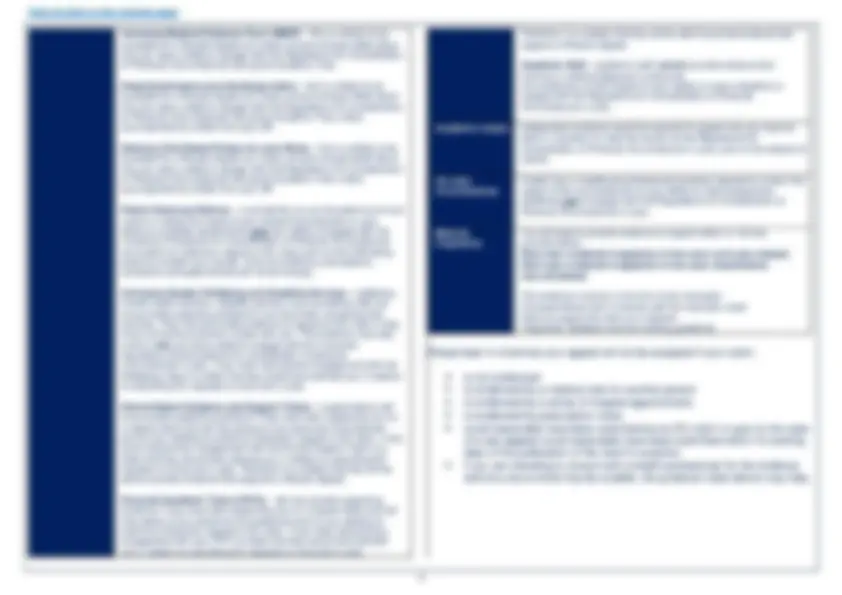
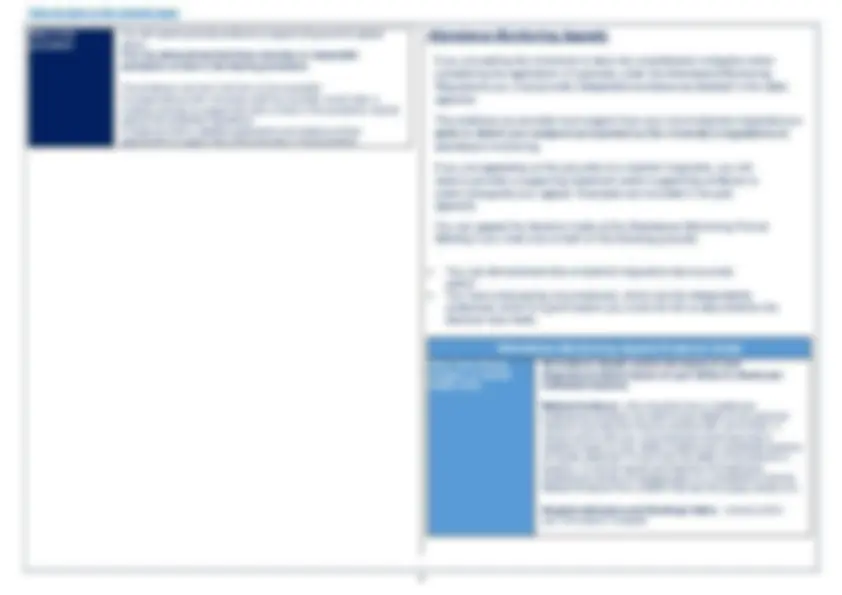
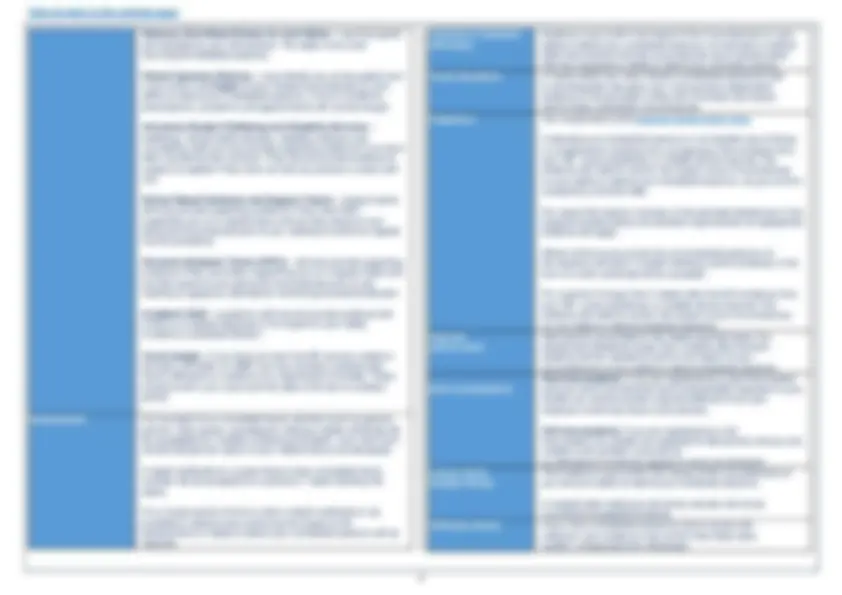
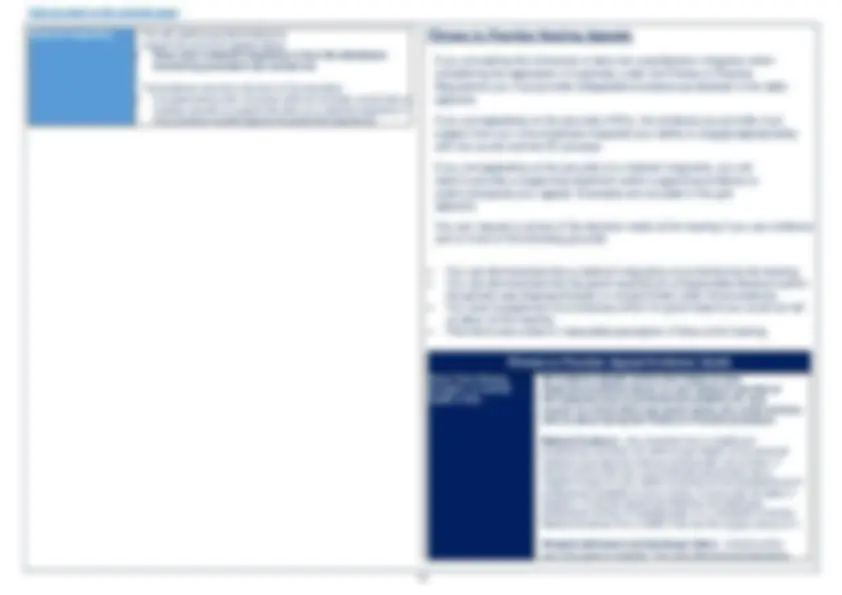
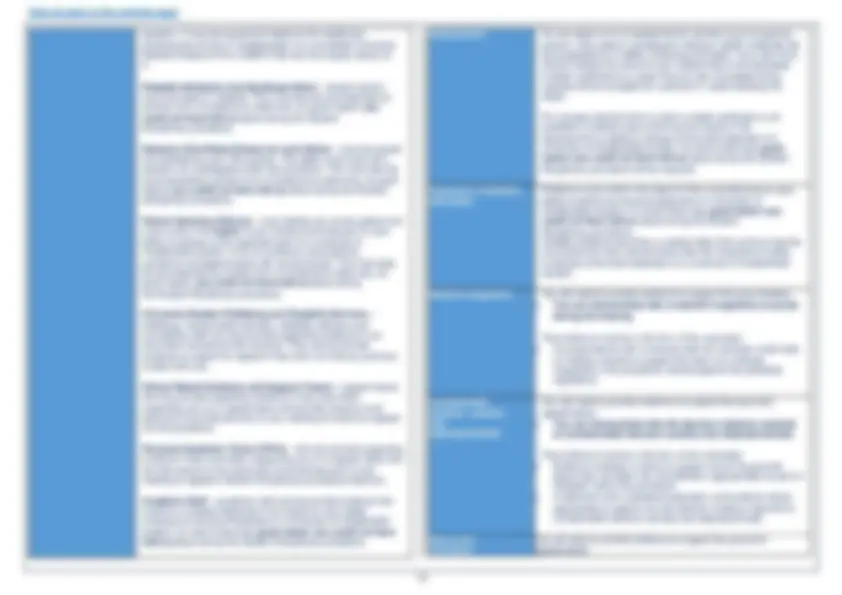
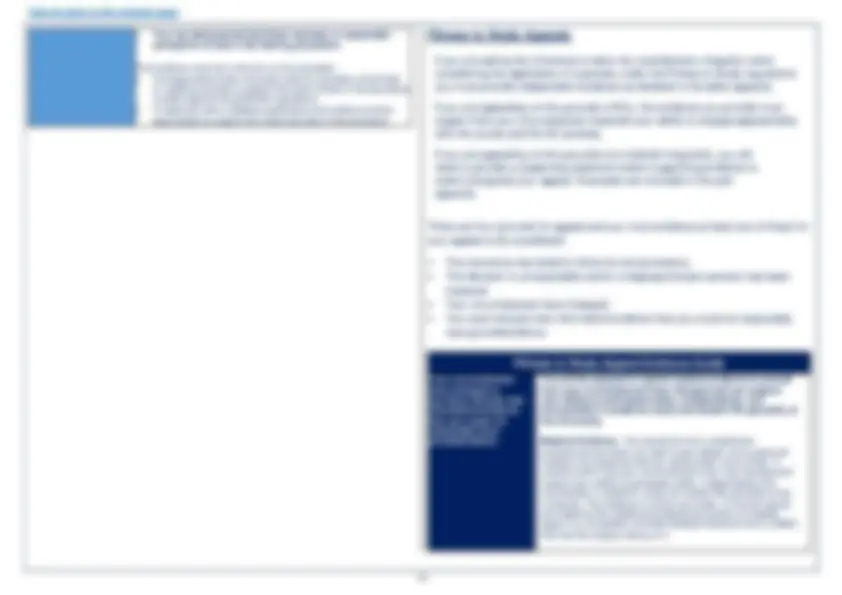
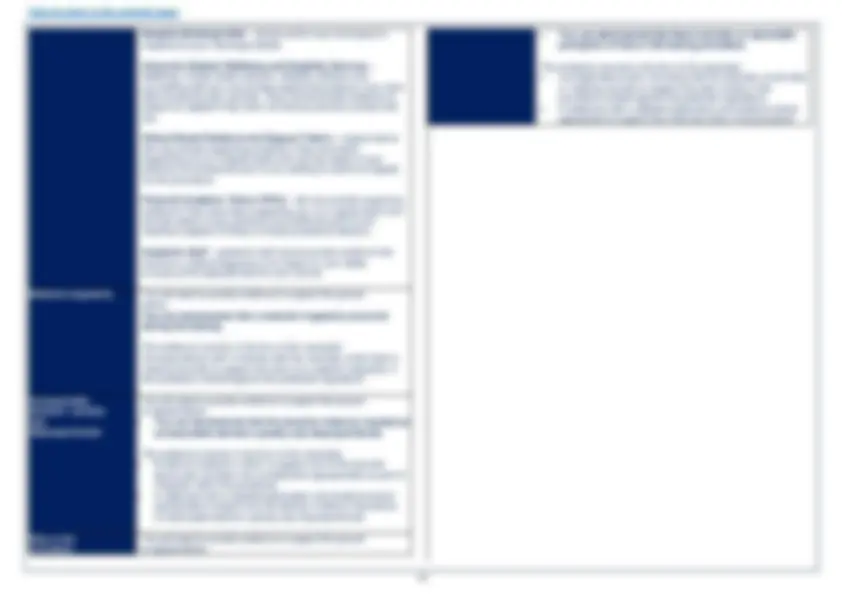
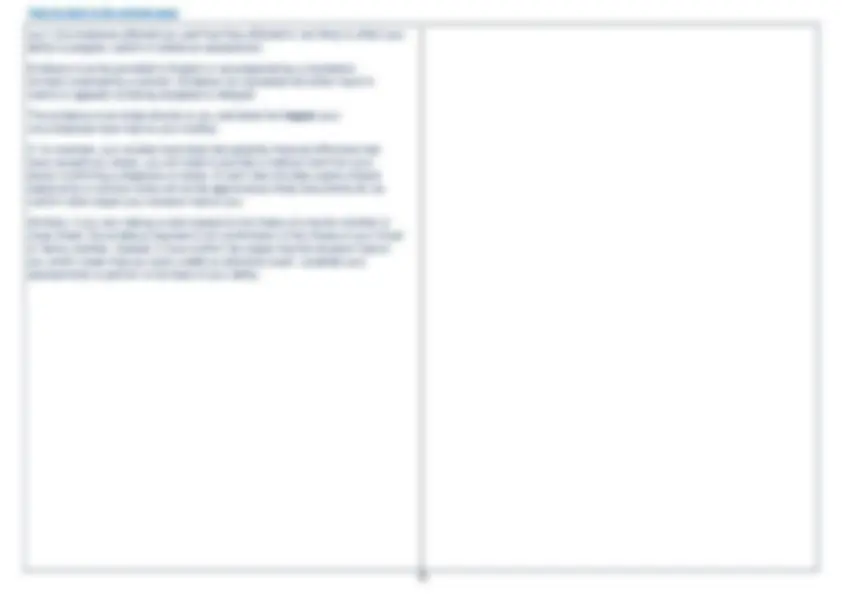


Study with the several resources on Docsity

Earn points by helping other students or get them with a premium plan


Prepare for your exams
Study with the several resources on Docsity

Earn points to download
Earn points by helping other students or get them with a premium plan
Community
Ask the community for help and clear up your study doubts
Discover the best universities in your country according to Docsity users
Free resources
Download our free guides on studying techniques, anxiety management strategies, and thesis advice from Docsity tutors
This document from the University of Huddersfield provides guidance on the types of evidence required for various academic appeals and procedures, including extension requests, academic misconduct, attendance monitoring, fitness to practise, student disciplinary, and fitness to study appeals. It outlines the specific evidence required for each ground of appeal and the sources from which this evidence can be obtained, such as University staff, wellbeing and disability services, and personal academic tutors.
What you will learn
Typology: Lecture notes
1 / 18

This page cannot be seen from the preview
Don't miss anything!











Short Term Illness, accident, or mental health crisis All evidence should confirm the impact of your diagnosis/condition/issues on your ability to complete your assessments on/by the due dates. Medical Evidence – this should be from a healthcare professional and does not need to give details of any personal medical circumstances that you would prefer not to share. It should confirm that your circumstances would have had a negative impact on your ability to complete/submit assessments by the due date. It must cover the dates of the current assessments. It must be signed and dated by the healthcare professional and be on headed paper or a completed University Medical Evidence Form (UMEF) that has the surgery stamp on it. Hospital admission and discharge letters - should confirm your time spent in hospital. Statutory Sick Notes/Fitness for work Notes – must be signed and stamped by your GP practice. The dates must cover the assessment deadlines. Patient Summary Notices – must identify you as the patient and must confirm the impact of your illness/circumstances on your ability to complete assessments. A list of conditions, prescriptions, symptoms and appointments will not be enough. University Student Wellbeing and Disability Services – wellbeing, mental health advisers, disability advisers and counselling staff can only provide supporting evidence if you have been accessing their services. They cannot provide evidence to support an EC claim if they have not had any previous contact with you. School Based Guidance and Support Teams – support teams will only provide supporting evidence if they have been supporting you on a regular basis and are fully aware of your personal circumstances prior to you needing to submit an Extension request or EC claim. Personal Academic Tutors (PATs) - will only provide supporting evidence if they have been supporting you on a regular basis and are fully aware of your personal circumstances prior to you needing to submit an Extension request or EC claim.
Childcare issues If you miss an exam due to issues with childcare, your evidence must confirm that these were sudden, unexpected and unforeseen. Material irregularity If you are claiming that you missed an assessment deadline due to an irregularity or misinformation from a tutor your evidence would need to confirm that poor/wrong advice was given (such as a copy of an email) and the impact that this would have had.
Short Term Illness, accident, or mental health crisis All evidence should confirm the impact of your diagnosis/condition/issues on your ability to complete your assessments on/by the due dates and your ability to engage with the University Procedures for Consideration of Personal Circumstances and submit an extension request or EC claim prior to the CAB taking place to consider your results. Medical Evidence – this should be from a healthcare professional and does not need to give details of any personal medical circumstances that you would prefer not to share. It should confirm that your circumstances would have had a negative impact on your ability to complete/submit assessments by the due date and your ability to engage with the University Procedures for Consideration of Personal Circumstances and submit an extension request or EC claim prior to the CAB taking place to consider your results. It must be signed and dated by the healthcare professional and be on headed paper
University Medical Evidence Form (UMEF) - this is unlikely to be accepted for a Results Appeal as it does not give enough detail about why you were unable to engage with the Regulations for Consideration of Personal Circumstances during the Academic Year. Hospital admission and discharge letters - this is unlikely to be accepted for a Results Appeal as it does not give enough detail about why you were unable to engage with the Regulations for Consideration of Personal Circumstances during the Academic Year unless accompanied by a letter from your GP. Statutory Sick Notes/Fitness for work Notes – this is unlikely to be accepted for a Results Appeal as it does not give enough detail about why you were unable to engage with the Regulations for Consideration of Personal Circumstances during the Academic Year unless accompanied by a letter from your GP. Patient Summary Notices – must identify you as the patient and must confirm in detail the impact of your illness/circumstances on your ability to complete assessments and your ability to engage with the University Procedures for Consideration of Personal Circumstances and submit an extension request or EC claim prior to the CAB taking place to consider your results. A list of conditions, prescriptions, symptoms and appointments will not be enough. University Student Wellbeing and Disability Services – wellbeing, mental health advisers, disability advisers and counselling staff can only provide supporting evidence if you have been accessing their services. They cannot provide evidence to support an EC claim if they have not had any previous contact with you. The evidence must also confirm why you were unable to engage with the University regulations and procedures for consideration of personal circumstances in year. If you have had previous engagement with the Wellbeing Team it is likely that they would have advised you in relation to submitting EC requests on time and in year. School Based Guidance and Support Teams – support teams will only provide supporting evidence if they have been supporting you on a regular basis and are fully aware of your personal circumstances prior to you needing to submit an Extension request or EC claim. If you have had previous engagement with the School Support Team it is likely that they would have advised you in relation to submitting EC requests on time and in year. Therefore it is unlikely that they will be able to provide evidence that supports a Results Appeal. Personal Academic Tutors (PATs) - will only provide supporting evidence if they have been supporting you on a regular basis and are fully aware of your personal circumstances prior to you needing to submit an Extension request or EC claim. If you have had previous engagement with your PAT it is likely that they would have advised you in relation to submitting EC requests on time and in year. Therefore, it is unlikely that they will be able to provide evidence that supports a Results Appeal. Academic Staff – academic staff cannot provide evidence that confirms a medical diagnosis or personal circumstances or their impact on your ability to meet a deadline or engage with the Regulations for Consideration of Personal Circumstances in year. Academic issues Independent evidence would be required to support why you had not been in a position to raise the issues via the Regulations for Consideration of Personal Circumstances in year, prior to the release of results. All other circumstances A letter from a healthcare professional would be required to confirm the impact of the circumstances on your ability to meet assessment deadlines and to engage with the Regulations for Consideration of Personal Circumstances in year. Material irregularity You will need to provide evidence to support either of the two grounds below;
Short Term Illness, accident, or mental health crisis All evidence should confirm the impact of your diagnosis/condition/issues were so severe that your decision- making was impaired and it affected your behaviour at the time of the assessment. The evidence must support that the circumstances were outside of your control and this impacted your decision to commit the alleged academic misconduct breach rather than engage with the Extenuating Circumstances Procedure. Medical Evidence – this should be from a healthcare professional and does not need to give details of any personal medical circumstances that you would prefer not to share. It should confirm that your circumstances would have had a negative impact on your ability to engage with the University Procedures for Consideration of Personal Circumstances and the impact of these on your decision making. It must be signed and dated by the healthcare professional and be on headed paper University Medical Evidence Form (UMEF) - this is unlikely to be accepted for an Academic Misconduct Appeal or as mitigating evidence as it does not give enough detail about why you were impacted by circumstances which led to the alleged academic misconduct allegation. Hospital admission and discharge letters - t this is unlikely to be accepted for an Academic Misconduct Appeal or as mitigating evidence as it does not give enough detail about why you were impacted by circumstances which led to the alleged academic misconduct allegation. Statutory Sick Notes/Fitness for work Notes – this is unlikely to be accepted for an Academic Misconduct Appeal or as mitigating evidence as it does not give enough detail about why you were impacted by circumstances which led to the alleged academic misconduct allegation. Patient Summary Notices – this is unlikely to be accepted for an Academic Misconduct Appeal or as mitigating evidence as it does not give enough detail about why you were impacted by circumstances which led to the alleged academic misconduct allegation. A list of conditions, prescriptions, symptoms and appointments will not be enough. University Student Wellbeing and Disability Services – wellbeing, mental health advisers, disability advisers and counselling staff can only provide supporting evidence if you have been accessing their services. They cannot provide evidence to support an appeal if they have not had any previous contact with you. School Based Guidance and Support Teams – support teams will only provide supporting evidence if they have been supporting you on a regular basis and are fully aware of your personal circumstances prior to you needing to submit an appeal via this procedure. Personal Academic Tutors (PATs) - will only provide supporting evidence if they have been supporting you on a regular basis and are fully aware of your personal circumstances prior to you needing to appeal an Academic Misconduct procedural decision or to submit mitigating evidence. Academic Staff – academic staff cannot provide evidence that confirms a medical diagnosis or personal circumstances or their impact on you to support an Academic Misconduct Appeal or as mitigating evidence. Bereavement For the death of an immediate family member (such as spouse, partner, child, parent, grandparent, sibling), a medical note confirming the impact of the bereavement on your decision making and behaviour at the time of the assessment will be required. Caring / family member illness The evidence must confirm the impact of the circumstances on you and your decision making and behaviour at the time of the assessment. A medical letter relating to the family member will not be considered acceptable evidence. Material irregularity You will need to provide evidence to support the ground to appeal below:
Unreasonable decision / penalty was disproportionate You will need to provide evidence to support the ground to appeal below:
Bias in the procedure You will need to provide evidence to support the ground to appeal below:
Short Term Illness, accident, or mental health crisis All evidence should confirm the impact of your diagnosis/condition/issues on your ability to attend your scheduled sessions. Medical Evidence – this should be from a healthcare professional and does not need to give details of any personal medical circumstances that you would prefer not to share. It should confirm that your circumstances would have had a negative impact on your ability to attend your scheduled sessions as usually expected. It must cover the dates of the sessions in question. It must be signed and dated by the healthcare professional and be on headed paper or a completed University Medical Evidence Form (UMEF) that has the surgery stamp on it. Hospital admission and discharge letters - should confirm your time spent in hospital.
Material irregularity You will need to provide evidence to support the ground to appeal below;
Short Term Illness, accident, or mental health crisis All evidence should confirm the impact of your diagnosis/condition/issues on your ability to practise at the expected level of professional suitability for your course, for which there was good reason you could not have told us about during the Fitness to Practise procedure. Medical Evidence – this should be from a healthcare professional and does not need to give details of any personal medical circumstances that you would prefer not to share. It should confirm that your circumstances would have had a negative impact on your ability to practise at the expected level of professional suitability for your course. It must cover all dates in question. It must be signed and dated by the healthcare professional and be on headed paper or a completed University Medical Evidence Form (UMEF) that has the surgery stamp on it. Hospital admission and discharge letters - should confirm your time spent in hospital. This must also be accompanied by
another form of evidence to state why, for good reason you could not have told us about during the Fitness to Practise procedure. Statutory Sick Notes/Fitness for work Notes – must be signed and stamped by your GP practice. The dates must cover all in question as investigated under the procedure. This must also be accompanied by another form of evidence to state why, for good reason you could not have told us about during the Fitness to Practise procedure. Patient Summary Notices – must identify you as the patient and must confirm the impact of your illness/circumstances on your ability to practise at the expected level of professional suitability for your course. A list of conditions, prescriptions, symptoms and appointments will not be enough. This must also be accompanied by another form of evidence to state why, for good reason you could not have told us about during the Fitness to Practise procedure. University Student Wellbeing and Disability Services – wellbeing, mental health advisers, disability advisers and counselling staff can only provide supporting evidence if you have been accessing their services. They cannot provide evidence to support an appeal if they have not had any previous contact with you. School Based Guidance and Support Teams – support teams will only provide supporting evidence if they have been supporting you on a regular basis and are fully aware of your personal circumstances prior to you needing to submit an appeal via this procedure. Personal Academic Tutors (PATs) - will only provide supporting evidence if they have been supporting you on a regular basis and are fully aware of your personal circumstances prior to you needing to appeal a Fitness to Practise procedural decision. Academic Staff – academic staff cannot provide evidence that confirms a medical diagnosis or its impact on your ability to practise at the expected level of professional suitability for your course, for which there was good reason you could not have told us about during the Fitness to Practise procedure. Bereavement For the death of an immediate family member (such as spouse, partner, child, parent, grandparent, sibling) a death certificate will be acceptable for 3 weeks a following the death. Your claim form should indicate the nature of your relationship to the deceased. A death certificate for a close friend or less immediate family member will be accepted for a period of 1 week following the death. For a longer period of time or when a death certificate is not available a medical note confirming the impact of the bereavement on ability to attend your on your ability to practise at the expected level of professional suitability for your course, for which there was good reason you could not have told us about during the Fitness to Practise procedure will be required. Financial or domestic difficulties Evidence must confirm the impact of the circumstances on your ability to practise at the expected level of professional suitability for your course, for which there was good reason you could not have told us about during the Fitness to Practise procedure. s, for example a medical letter that confirms that the circumstances have caused stress that has impacted on ability to attend any University activity. Pregnancy You should refer to the pregnant student policy here. If your ability to practise at the expected level of professional suitability for your course, for which there was good reason you could not have told us about during the Fitness to Practise procedure was affected due to illness or complications resulting from a pregnancy then evidence from your GP, nurse practitioner or midwife will be required. The evidence will need to confirm the impact of your circumstances on your ability to practise at the expected level of suitability for your course, not just confirm a pregnancy and due date. For cases that require in excess of the standard allowances in the pregnant student policy the standard requirements for appropriate evidence will apply. Material irregularity You will need to provide evidence to support the ground below;
Unreasonable decision / penalty was disproportionate You will need to provide evidence to support the ground to appeal below;
question. It must be signed and dated by the healthcare professional and be on headed paper or a completed University Medical Evidence Form (UMEF) that has the surgery stamp on it. Hospital admission and discharge letters - should confirm your time spent in hospital. This must also be accompanied by another form of evidence to state why, for good reason you could not have told us about during the Student Disciplinary procedure. Statutory Sick Notes/Fitness for work Notes – must be signed and stamped by your GP practice. The dates must cover all in question as investigated under the procedure. This must also be accompanied by another form of evidence to state why, for good reason you could not have told us about during the Student Disciplinary procedure. Patient Summary Notices – must identify you as the patient and must confirm the impact of your illness/circumstances on your ability to behave at the expected level of a University of Huddersfield student. A list of conditions, prescriptions, symptoms and appointments will not be enough. This must also be accompanied by another form of evidence to state why, for good reason you could not have told us about during the Student Disciplinary procedure. University Student Wellbeing and Disability Services – wellbeing, mental health advisers, disability advisers and counselling staff can only provide supporting evidence if you have been accessing their services. They cannot provide evidence to support an appeal if they have not had any previous contact with you. School Based Guidance and Support Teams – support teams will only provide supporting evidence if they have been supporting you on a regular basis and are fully aware of your personal circumstances prior to you needing to submit an appeal via this procedure. Personal Academic Tutors (PATs) - will only provide supporting evidence if they have been supporting you on a regular basis and are fully aware of your personal circumstances prior to you needing to appeal a Student Disciplinary procedural decision. Academic Staff – academic staff cannot provide evidence that confirms a medical diagnosis or its impact on your ability to behave at the level expected of a University of Huddersfield student, for which there was good reason you could not have told us about during the Student Disciplinary procedure. Bereavement For the death of an immediate family member (such as spouse, partner, child, parent, grandparent, sibling) a death certificate will be acceptable for 3 weeks a following the death. Your claim form should indicate the nature of your relationship to the deceased. A death certificate for a close friend or less immediate family member will be accepted for a period of 1 week following the death. For a longer period of time or when a death certificate is not available a medical note confirming the impact of the bereavement on ability to behave at the level expected of a University of Huddersfield student, for which there was good reason you could not have told us about during the Student Disciplinary procedure will be required. Financial or domestic difficulties Evidence must confirm the impact of the circumstances on your ability to behave at the level expected of a University of Huddersfield student, for which there was good reason you could not have told us about during the Student Disciplinary procedure. Suitable evidence would be a medical letter that confirms that the circumstances have caused stress that has impacted on ability to behave at the level expected of a University of Huddersfield student. Material irregularity You will need to provide evidence to support the ground below:
Unreasonable decision / penalty was disproportionate You will need to provide evidence to support the ground to appeal below:
Bias in the procedure You will need to provide evidence to support the ground to appeal below:
Your circumstances have changed or you have relevant new information/evidence that you could not reasonably have provided before. You will be required to submit medical evidence to provide how your circumstances have changed and can support your ability to participate safely, independently, and successfully in academic study and student life generally at the University. Medical Evidence – this should be from a healthcare professional and does not need to give details of any personal medical circumstances that you would prefer not to share. It should confirm that your circumstances have now changed and support your ability to participate safely, independently and successfully in academic study and student life generally at the University. The evidence must be up to date. It must be signed and dated by the healthcare professional and be on headed paper or a completed University Medical Evidence Form (UMEF) that has the surgery stamp on it.
Evidence to support a student complaint Please provide correspondence (for example, emails trails) or a brief statement which outlines the background to your complaint. You do not need to provide copies of university documents; therefore, you should not need to provide a copy of the course handbook for example. A brief statement should set out the circumstances impacting you as you perceive them and the outcome you are seeking from your complaint. It should provide the investigator sufficient information to understand your complaint, however during the Stage 1 investigation you will have opportunity to discuss the complaint with the investigator therefore your points can be expanded on then. We would not be able to accept evidence which does not relate to you or is provided in breach of GDPR data protection legislation or the University’s data policies. New Evidence at Stage 3 Request for Review If you wish to submit new evidence at a later stage of the procedure you must have good reason for doing so which is supported by independent evidence. Medical Evidence – this should be from a healthcare professional and does not need to give details of any personal medical circumstances that you would prefer not to share. It should confirm that your circumstances have impacted your ability to engage with the processes at the University and specifically your ability to engage with the Student Complaints procedure. The evidence must be up to date. It must be signed and dated by the healthcare professional and be on headed paper or a completed University Medical Evidence Form (UMEF) that has the surgery stamp on it. Hospital discharge letter - should confirm your time spent in hospital and your discharge details. University Student Wellbeing and Disability Services – wellbeing, mental health advisers, disability advisers and counselling staff can only provide supporting evidence if you have been accessing their services. They cannot provide evidence to support an appeal if they have not had any previous contact with you. School Based Guidance and Support Teams – support teams will only provide supporting evidence if they have been supporting you on a regular basis and are fully aware of your personal circumstances prior to you needing to engage with this procedure. Personal Academic Tutors (PATs) - will only provide supporting evidence if they have been supporting you on a regular basis and are fully aware of your personal circumstances prior to you needing to engage with this procedure. Academic Staff – academic staff cannot provide evidence that confirms a medical diagnosis or its impact on your ability to engage with this procedure. Complaints submitted outside of the timescale provided in the Student Complaints Procedure If you have been unable to submit your student complaint and supporting evidence in accordance with the timescales provided in the Student Complaints Procedure, we may not accept the complaint as eligible for investigation. If you submit your complaint late, you must provide independent evidence which confirms it would not have been possible for you to engage with the process sooner. Medical Evidence – this should be from a healthcare professional and does not need to give details of any personal medical circumstances that you would prefer not to share. It should confirm that your circumstances have impacted your ability to engage with the processes at the University and specifically your ability to engage with the Student Complaints procedure. The evidence must be up to date. It must be signed and dated by the healthcare professional and be on headed paper or a completed University Medical Evidence Form (UMEF) that has the surgery stamp on it. Hospital discharge letter - should confirm your time spent in hospital and your discharge details. University Student Wellbeing and Disability Services – wellbeing, mental health advisers, disability advisers and counselling staff can only provide supporting evidence if you have been accessing their services. They cannot provide evidence to support an appeal if they have not had any previous contact with you.
School Based Guidance and Support Teams – support teams will only provide supporting evidence if they have been supporting you on a regular basis and are fully aware of your personal circumstances prior to you needing to engage with this procedure. Personal Academic Tutors (PATs) - will only provide supporting evidence if they have been supporting you on a regular basis and are fully aware of your personal circumstances prior to you needing to engage with this procedure. Academic Staff – academic staff cannot provide evidence that confirms a medical diagnosis or its impact on your ability to engage with this procedure.